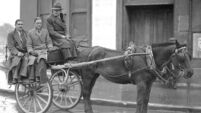May your days be merry and... dry?! What 'Merry' Christmas really means (and it's nothing to do with booze)

'Merry Christmas' is a popular message on cards
God rest you merry, gentlemen,
Let nothing you dismay...
IT’S an old Christmas carol to which we hear at least the tune at this time of year, if not in church than certainly as we sashay around shopping centres.
For years, however, I made the decision not to send Christmas cards where the printed greeting was ‘Merry Christmas’, but to stick with ‘Happy Christmas’, or possibly ‘Blessed’ or ‘Peaceful’.
It must have been a streak of puritanism I didn’t know I possessed, but ‘merry’ always sounded rather like a Christmas office party where the drink was in over-abundant supply.
However, I’m not entirely devoid of curiosity. I was curious to understand why ‘merry’ should have become part of a customary greeting for Christmas, certainly since Victorian times. After all, we don’t usually wish anyone a ‘merry Easter’ or a ‘Merry birthday’.
I discovered merry is actually an old word and, in its origins, a much more serious one than happy.
‘Happy’ has an element of luck or chance - good fortune - about it. ‘Merry’, as it was originally understood, had resonances of joy and of harmony and even of something that is beyond human time or emotion.
We might go so far as to say that ‘merry’ implied something that touches the eternal; that takes us outside human time because the sheer joy of what we experience is such that we do not even notice time passing. If you think about it, there is a connection between merry and things going quickly because they are so pleasurable.
We can still speak, even if a little pompously, about something moving along ‘at a merry pace’.
So, ‘Merry Christmas’ is an old, relatively serious festive greeting. One of its earliest uses we know of was nearly 500 years ago. In an unsafe time in the history of England, Bishop of Rochester, John Fisher, sent season’s greetings to King Henry VIII’s principal advisor Thomas Cromwell, an extremely dangerous individual, in 1534 - “And this our Lord God send you a mery Christmas.”
It might be added that much good it did Fisher, as six months later Cromwell had him executed for his opposition to the King.
So what are we to make of a favourite Christmas carol, God Rest Ye Merry, Gentlemen? The first thing to remember, after we have overlooked the inappropriate gendering, is that we mentally place the comma in the right place, after ‘merry’ rather than before it - it’s not about merry gentlemen returning from the pub who want nothing more than some decent rest!
The carol is the appeal that Christmas may be a time that gives us joy and exhilaration centred on the events of the first Christmas, which are outlined in the remaining verses. Being ‘rested’ was to be held secure, so the carol is a reminder of the basics of the Christmas story, and also that they brought tidings - messages - of comfort as well as of joy that lifts an authentic Christmas out of the ordinary, out of the limitations of time and place.
If we concentrate on the carol’s words, it reminds us the reason why Christmas can indeed be merry is not because it is a time of escapism from reality but rather the reverse.
There is no part of life on this earth where God does not have a place, or from which he can or will absent himself, or that he will ever leave. God does not do exit strategies from the earth. And nor should we seek the solace of escapism from the realities of life either.
Christmas is not just a heart-warming little tale to fill in a few days in the depths of winter. What we believe when we say we believe in the Incarnation is that God came to be within the world, that he is within the world, not simply looking down at us. There is nothing in human longing, sorrow, pain, or aspiration that he does not know from INSIDE. This is the God we worship at Christmas and that should make us merry in its original sense.
In 1843, A Christmas Carol by Charles Dickens was printed, with a reference to “God rest you merry, gentlemen” (albeit without the necessary comma in the first line). It comes early in the story, before Scrooge painfully learns the lessons of humanity and of charity.
“The owner of one scant young nose, gnawed and numbed by the hungry cold as bones are gnawed by dogs, stooped down at Scrooge’s keyhole to regale him with a Christmas carol: but at the first sound of ‘God bless you, merry gentlemen! May nothing you dismay!’ Scrooge seized the ruler with such energy of action, that the singer fled in terror, leaving the keyhole to the fog and even more congenial frost.”
Dickens is said to have changed the way people thought about Christmas. We know he cared deeply about the dreadful conditions in which many lived (and sadly, many people still live on this island as elsewhere). And Scrooge learns rather dramatically that Christmas is about generosity, about seeing needs and pain in others and responding, it’s about humanity, about a truly costly compassion to others.
So, as Tiny Tim is able to say at the end of A Christmas Carol, thanks to the new-found generosity of Mr Scrooge, “A merry Christmas to everybody; God bless us, everyone!”
This story appears in this year's Holly Bough, which contains 164 pages packed with great stories about Cork and Christmas. On sale now in shops and at hollybough.ie - €6.







